From August 5 to 14, 2024, Universitas Jember hosted the Summer Course of Coffee 2024, a collaborative program involving various international institutions, including the University of California Davis (UC Davis) and the Indonesian Coffee and Cocoa Research Institute (ICCRI). This program was designed to explore the potential of Indonesian coffee, particularly in the Jember region, and to strengthen the relationship between academics and practitioners in the coffee industry.
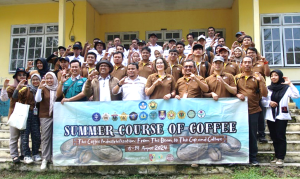 The Faculty of Agricultural Technology at Universitas Gadjah Mada sent one of its graduate students in Plantation Products Technology, Rachma Widya Puspita, to participate in this international summer course on coffee. In addition, Universitas Gadjah Mada also sent Dr. Widiastuti Setyaningsih as a mentor for this event, demonstrating UGM’s commitment to supporting academic development and international collaboration.
The Faculty of Agricultural Technology at Universitas Gadjah Mada sent one of its graduate students in Plantation Products Technology, Rachma Widya Puspita, to participate in this international summer course on coffee. In addition, Universitas Gadjah Mada also sent Dr. Widiastuti Setyaningsih as a mentor for this event, demonstrating UGM’s commitment to supporting academic development and international collaboration.
Opening Ceremony and Educational Visits The activities began with an opening ceremony on August 5, 2024, attended by the Vice Rector of Universitas Jember and representatives from UC Davis. The participants were invited to visit various top facilities at Universitas Jember, including the Center for Development of Advanced Sciences and Technology (CDAST) and Agrotechnopark, where they were introduced to modern agricultural technology and practices applied in coffee and other crop development.
From August 5 to 14, 2024, Universitas Jember hosted the Summer Course of Coffee 2024, a collaborative program involving various international institutions, including the University of California Davis (UC Davis) and the Indonesian Coffee and Cocoa Research Institute (ICCRI). This program was designed to explore the potential of Indonesian coffee, particularly in the Jember region, and to strengthen the relationship between academics and practitioners in the coffee industry.
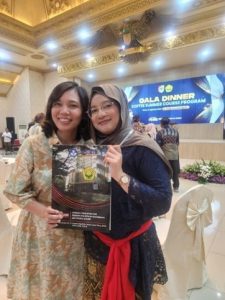 The Faculty of Agricultural Technology at Universitas Gadjah Mada sent one of its graduate students in Plantation Products Technology, Rachma Widya Puspita, to participate in this international summer course on coffee. In addition, Universitas Gadjah Mada also sent Dr. Widiastuti Setyaningsih as a mentor for this event, demonstrating UGM’s commitment to supporting academic development and international collaboration.
The Faculty of Agricultural Technology at Universitas Gadjah Mada sent one of its graduate students in Plantation Products Technology, Rachma Widya Puspita, to participate in this international summer course on coffee. In addition, Universitas Gadjah Mada also sent Dr. Widiastuti Setyaningsih as a mentor for this event, demonstrating UGM’s commitment to supporting academic development and international collaboration.
Opening Ceremony and Educational Visits The activities began with an opening ceremony on August 5, 2024, attended by the Vice Rector of Universitas Jember and representatives from UC Davis. The participants were invited to visit various top facilities at Universitas Jember, including the Center for Development of Advanced Sciences and Technology (CDAST) and Agrotechnopark, where they were introduced to modern agricultural technology and practices applied in coffee and other crop development.
Conclusion The Summer Course of Coffee 2024 successfully combined education, research, and practical experience, enriching the participants’ understanding of the coffee industry. Through this international collaboration, Universitas Jember not only strengthened its position as a center of excellence in coffee research but also played an active role in supporting the sustainability and welfare of the coffee farming community in Indonesia. UGM’s participation, both through its mentor and students, is a testament to its commitment to academic development and synergy between educational institutions.
contributor : Rachma Widya Puspita

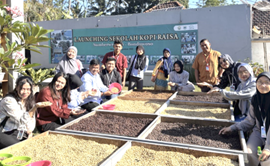
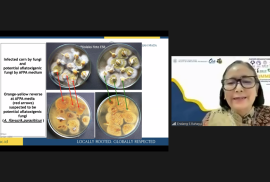
 The series of events on the fourth day started at 07.55, which started with an opening by the master of ceremonies. Then continued with the first session by Dr. Widyastuti Setyaningsih, S.T.P. with “Application of experimental designs to develop analytical methods for bioactive compounds in foods” as topic. This session was also accompanied by Ashri Nugrahini, S.T.P., M. Sc.. Dr Widyastuti starts the topic with how bioactive compounds in rice can be separated with chromatographic methods. And then this method can be replaced with other experimental designs. The experimental design can be applied using analytical extraction techniques, namely MAE and PLE and analytical separation techniques, namely HPLC-PDA and UPLC-PDA-FD.
The series of events on the fourth day started at 07.55, which started with an opening by the master of ceremonies. Then continued with the first session by Dr. Widyastuti Setyaningsih, S.T.P. with “Application of experimental designs to develop analytical methods for bioactive compounds in foods” as topic. This session was also accompanied by Ashri Nugrahini, S.T.P., M. Sc.. Dr Widyastuti starts the topic with how bioactive compounds in rice can be separated with chromatographic methods. And then this method can be replaced with other experimental designs. The experimental design can be applied using analytical extraction techniques, namely MAE and PLE and analytical separation techniques, namely HPLC-PDA and UPLC-PDA-FD.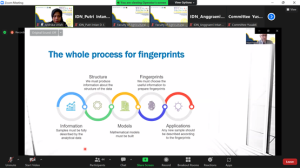 In the third session, Prof. Miguel Palma explained the material about Chemometric Tools in Food Analysis : from Numerical Data to Fingerprints. This session was moderated by Ardhika Ulfah, S.T.P., M.Sc.. Prof. Miguel Palma, in this session begins with an explanation regarding the analysis of the web browser’s working system so that it can meet the needs of its users through the collection of user behavior data. This can be applied to the food industry by collecting data so that fruit or vegetables can be sorted without touching or damaging them based on an existing data base. Another use in the food industry is that fingerprints enable simple, fast, and automated answers that can assist identification and quality control in food companies.
In the third session, Prof. Miguel Palma explained the material about Chemometric Tools in Food Analysis : from Numerical Data to Fingerprints. This session was moderated by Ardhika Ulfah, S.T.P., M.Sc.. Prof. Miguel Palma, in this session begins with an explanation regarding the analysis of the web browser’s working system so that it can meet the needs of its users through the collection of user behavior data. This can be applied to the food industry by collecting data so that fruit or vegetables can be sorted without touching or damaging them based on an existing data base. Another use in the food industry is that fingerprints enable simple, fast, and automated answers that can assist identification and quality control in food companies.